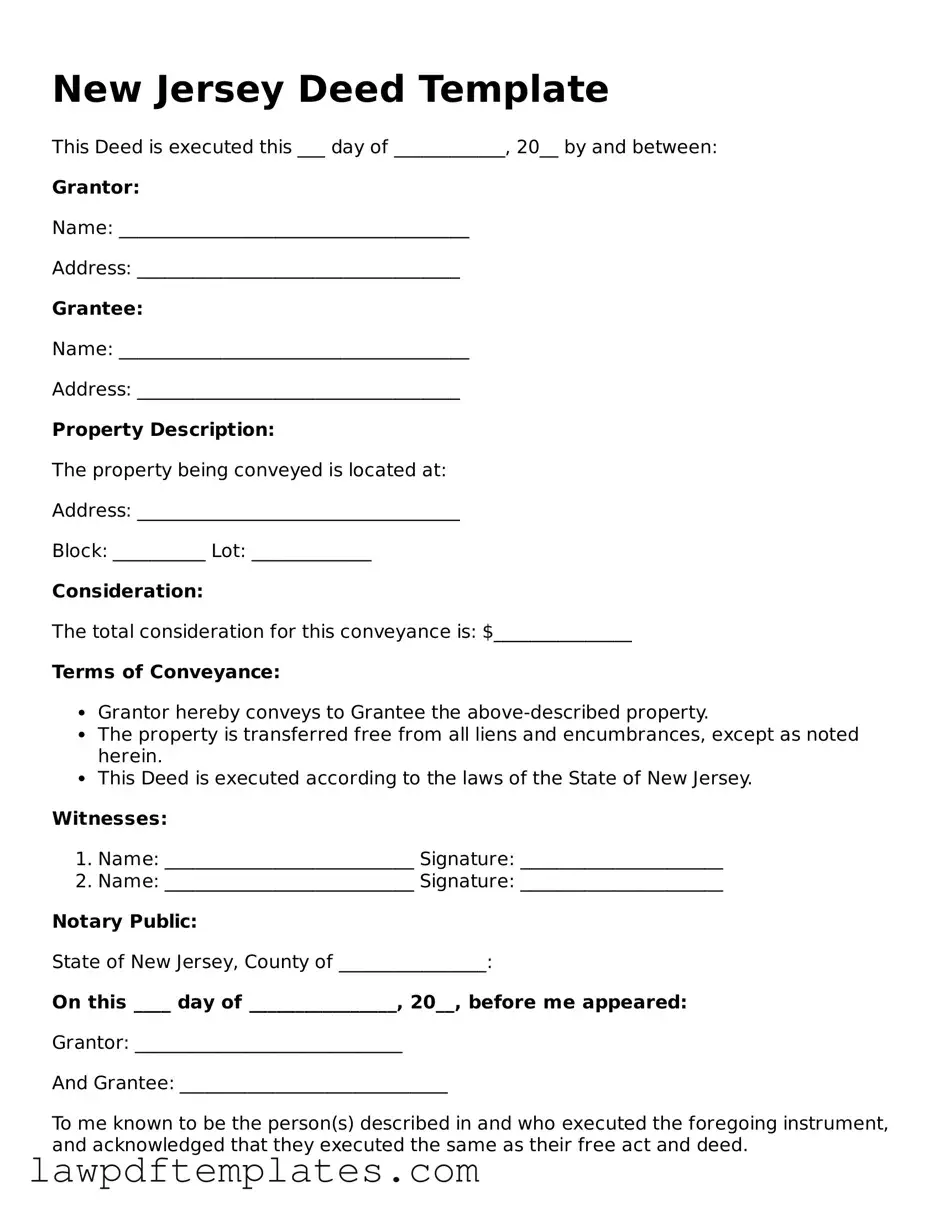Free Deed Template for the State of New Jersey
Form Breakdown
| Fact Name | Description |
|---|---|
| Governing Law | The New Jersey Deed form is governed by the New Jersey Statutes Annotated, specifically Title 46, which addresses property laws. |
| Types of Deeds | New Jersey recognizes several types of deeds, including warranty deeds, quitclaim deeds, and bargain and sale deeds, each serving different purposes in property transfer. |
| Recording Requirements | To ensure legal validity, the completed deed must be recorded with the county clerk’s office in the county where the property is located. |
| Signature Requirements | The deed must be signed by the grantor (the person transferring the property) in the presence of a notary public to be enforceable. |
| Transfer Tax | New Jersey imposes a realty transfer fee on property transactions, which varies based on the sale price of the property. |
Sample - New Jersey Deed Form
New Jersey Deed Template
This Deed is executed this ___ day of ____________, 20__ by and between:
Grantor:
Name: ______________________________________
Address: ___________________________________
Grantee:
Name: ______________________________________
Address: ___________________________________
Property Description:
The property being conveyed is located at:
Address: ___________________________________
Block: __________ Lot: _____________
Consideration:
The total consideration for this conveyance is: $_______________
Terms of Conveyance:
- Grantor hereby conveys to Grantee the above-described property.
- The property is transferred free from all liens and encumbrances, except as noted herein.
- This Deed is executed according to the laws of the State of New Jersey.
Witnesses:
- Name: ___________________________ Signature: ______________________
- Name: ___________________________ Signature: ______________________
Notary Public:
State of New Jersey, County of ________________:
On this ____ day of ________________, 20__, before me appeared:
Grantor: _____________________________
And Grantee: _____________________________
To me known to be the person(s) described in and who executed the foregoing instrument, and acknowledged that they executed the same as their free act and deed.
Notary Signature: ___________________________
My Commission Expires: _____________________
This Deed is made under the laws of the State of New Jersey and shall be interpreted in accordance with those laws.
Common mistakes
When filling out the New Jersey Deed form, individuals often overlook critical details that can lead to complications. One common mistake is failing to provide accurate property descriptions. The property description must be precise and include the lot number, block number, and municipality. A vague or incorrect description can create confusion and may affect the validity of the deed.
Another frequent error involves the omission of necessary signatures. All parties involved in the transaction must sign the deed. If even one signature is missing, the deed may be considered incomplete. This oversight can delay the transfer of ownership and lead to additional legal issues down the line.
Many individuals also neglect to include the correct consideration amount. The consideration is the price paid for the property, and it must be stated clearly on the deed. Inaccurate or missing information regarding the consideration can raise questions about the transaction and may result in tax implications.
Additionally, people sometimes fail to notarize the deed properly. New Jersey requires that the deed be acknowledged by a notary public. Without this notarization, the deed may not be enforceable. It is essential to ensure that the notary public signs and stamps the document correctly.
Lastly, individuals may forget to check for any liens or encumbrances on the property before completing the deed. A deed that does not account for existing liens can lead to legal disputes. It is advisable to conduct a thorough title search to avoid potential problems after the transfer of ownership.
Discover More Deed Templates for Specific States
Release of Dower Rights Ohio Form - May require disclosure of property defects or issues.
Broward County Recorder of Deeds - The deed must be dated to be legally effective.
For employers looking to streamline their processes and comply with state regulations, utilizing the Texas Employment Verification form is essential. This form not only verifies an employee's work status but also supports their benefit applications, thus making it crucial for timely processing. To facilitate this, you can conveniently access the form at texasformspdf.com/fillable-texas-employment-verification-online, ensuring that all necessary information is accurately submitted.
Georgia Quit Claim Deed - The legality of the Deed may be challenged if not properly executed.
